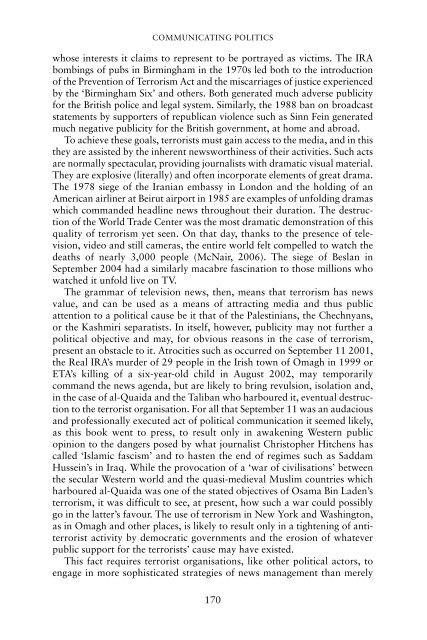20130412164339753295_book_an-introduction-to-political-communication
20130412164339753295_book_an-introduction-to-political-communication
20130412164339753295_book_an-introduction-to-political-communication
Create successful ePaper yourself
Turn your PDF publications into a flip-book with our unique Google optimized e-Paper software.
COMMUNICATING POLITICS<br />
whose interests it claims <strong>to</strong> represent <strong>to</strong> be portrayed as victims. The IRA<br />
bombings of pubs in Birmingham in the 1970s led both <strong>to</strong> the <strong>introduction</strong><br />
of the Prevention of Terrorism Act <strong>an</strong>d the miscarriages of justice experienced<br />
by the ‘Birmingham Six’ <strong>an</strong>d others. Both generated much adverse publicity<br />
for the British police <strong>an</strong>d legal system. Similarly, the 1988 b<strong>an</strong> on broadcast<br />
statements by supporters of republic<strong>an</strong> violence such as Sinn Fein generated<br />
much negative publicity for the British government, at home <strong>an</strong>d abroad.<br />
To achieve these goals, terrorists must gain access <strong>to</strong> the media, <strong>an</strong>d in this<br />
they are assisted by the inherent newsworthiness of their activities. Such acts<br />
are normally spectacular, providing journalists with dramatic visual material.<br />
They are explosive (literally) <strong>an</strong>d often incorporate elements of great drama.<br />
The 1978 siege of the Ir<strong>an</strong>i<strong>an</strong> embassy in London <strong>an</strong>d the holding of <strong>an</strong><br />
Americ<strong>an</strong> airliner at Beirut airport in 1985 are examples of unfolding dramas<br />
which comm<strong>an</strong>ded headline news throughout their duration. The destruction<br />
of the World Trade Center was the most dramatic demonstration of this<br />
quality of terrorism yet seen. On that day, th<strong>an</strong>ks <strong>to</strong> the presence of television,<br />
video <strong>an</strong>d still cameras, the entire world felt compelled <strong>to</strong> watch the<br />
deaths of nearly 3,000 people (McNair, 2006). The siege of Besl<strong>an</strong> in<br />
September 2004 had a similarly macabre fascination <strong>to</strong> those millions who<br />
watched it unfold live on TV.<br />
The grammar of television news, then, me<strong>an</strong>s that terrorism has news<br />
value, <strong>an</strong>d c<strong>an</strong> be used as a me<strong>an</strong>s of attracting media <strong>an</strong>d thus public<br />
attention <strong>to</strong> a <strong>political</strong> cause be it that of the Palestini<strong>an</strong>s, the Chechny<strong>an</strong>s,<br />
or the Kashmiri separatists. In itself, however, publicity may not further a<br />
<strong>political</strong> objective <strong>an</strong>d may, for obvious reasons in the case of terrorism,<br />
present <strong>an</strong> obstacle <strong>to</strong> it. Atrocities such as occurred on September 11 2001,<br />
the Real IRA’s murder of 29 people in the Irish <strong>to</strong>wn of Omagh in 1999 or<br />
ETA’s killing of a six-year-old child in August 2002, may temporarily<br />
comm<strong>an</strong>d the news agenda, but are likely <strong>to</strong> bring revulsion, isolation <strong>an</strong>d,<br />
in the case of al-Quaida <strong>an</strong>d the Talib<strong>an</strong> who harboured it, eventual destruction<br />
<strong>to</strong> the terrorist org<strong>an</strong>isation. For all that September 11 was <strong>an</strong> audacious<br />
<strong>an</strong>d professionally executed act of <strong>political</strong> <strong>communication</strong> it seemed likely,<br />
as this <strong>book</strong> went <strong>to</strong> press, <strong>to</strong> result only in awakening Western public<br />
opinion <strong>to</strong> the d<strong>an</strong>gers posed by what journalist Chris<strong>to</strong>pher Hitchens has<br />
called ‘Islamic fascism’ <strong>an</strong>d <strong>to</strong> hasten the end of regimes such as Saddam<br />
Hussein’s in Iraq. While the provocation of a ‘war of civilisations’ between<br />
the secular Western world <strong>an</strong>d the quasi-medieval Muslim countries which<br />
harboured al-Quaida was one of the stated objectives of Osama Bin Laden’s<br />
terrorism, it was difficult <strong>to</strong> see, at present, how such a war could possibly<br />
go in the latter’s favour. The use of terrorism in New York <strong>an</strong>d Washing<strong>to</strong>n,<br />
as in Omagh <strong>an</strong>d other places, is likely <strong>to</strong> result only in a tightening of <strong>an</strong>titerrorist<br />
activity by democratic governments <strong>an</strong>d the erosion of whatever<br />
public support for the terrorists’ cause may have existed.<br />
This fact requires terrorist org<strong>an</strong>isations, like other <strong>political</strong> ac<strong>to</strong>rs, <strong>to</strong><br />
engage in more sophisticated strategies of news m<strong>an</strong>agement th<strong>an</strong> merely<br />
170
















